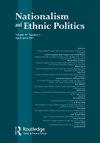社会与政治领域中的族群认同:一个新的概念模型
IF 1.1
Q3 ETHNIC STUDIES
引用次数: 0
摘要
本文试图在罗杰斯·布鲁贝克的民族范畴和民族群体概念创新的基础上加以完善。这种概念上的区别使群体主义的研究方法出现了问题,并将族群性作为一个变量来探索族群形成的过程和动态。在本研究中,我从两个方面改进和发展了布鲁贝克的概念区分。首先,我提出了在现象世界中衡量民族类别和民族群体的指标。其次,在上述概念区分的基础上建立概念模型。基于族群成员在社会和政治领域中如何表现其族群认同,我提出族群认同可以有四种形式:(1)在社会和政治上活跃的族群认同,(2)在社会上活跃但在政治上休眠的族群认同,(3)在社会上休眠但在政治上活跃的族群认同,(4)在社会和政治上休眠的族群认同。我认为,通过将这些身份形式应用于土耳其库尔德人的案例,可以帮助我们更好地理解种族类别和族裔群体这两个术语在个人层面上的含义。本文章由计算机程序翻译,如有差异,请以英文原文为准。
Ethnic Identity in Social and Political Domains: A New Conceptual Model
Abstract In this paper, I attempt to build on and improve a significant conceptual innovation, made by Rogers Brubaker, between the terms ethnic category and ethnic group. This conceptual distinction problematizes groupist approaches and takes ethnic groupness as a variable to explore processes and dynamics of ethnic group formation. In this study, I improve and develop Brubaker’s conceptual distinction in two ways. First, I propose indicators for measuring ethnic category and ethnic group in the phenomenal world. Second, I develop a conceptual model based on the aforementioned conceptual distinction. I propose that ethnic identity can take four forms on the bases of how ethnic category members perform their ethnic identities in social and political domains: (1) socially and politically active ethnic identity, (2) socially active but politically dormant ethnic identity, (3) socially dormant but politically active ethnic identity, (4) socially and politically dormant ethnic identity. I suggest that these identity forms help us better understand the implications of the terms ethnic category and ethnic group at individual level by applying it to the Kurdish case in Turkey.
求助全文
通过发布文献求助,成功后即可免费获取论文全文。
去求助
来源期刊

Nationalism and Ethnic Politics
ETHNIC STUDIES-
CiteScore
1.30
自引率
0.00%
发文量
30
期刊介绍:
Nationalism & Ethnic Politics explores the varied political aspects of nationalism and ethnicity in order to develop more constructive inter-group relations. The journal publishes case studies and comparative and theoretical analyses. It deals with pluralism, ethno-nationalism, irredentism, separatism, and related phenomena, and examines processes and theories of ethnic identity formation, mobilization, conflict and accommodation in the context of political development and "nation-building". The journal compares and contrasts state and community claims, and deal with such factors as citizenship, race, religion, economic development, immigration, language, and the international environment.
 求助内容:
求助内容: 应助结果提醒方式:
应助结果提醒方式:


